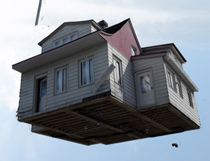A Page from the Wonders of Life on Earth
by Stephanie Bolster,
London, Ontario: Brick Books
79 pp., $19.00
Stephanie Bolster’s fourth collection of poetry, A Page from the Wonders of Life on Earth, continues to show her skill as a poet. Her first collection, White Stone: The Alice Poems, won the Governor General’s Award in 1998, and it’s not hard to see why, given the range and strength of this latest book.
Bolster’s poetic structure is often the single line stanza occasionally with no verb, and the combination falls into the imagist tradition, but the structure is solid and unique while working within accepted frameworks. And the topics range from childhood to travel to art, and in in this collection, animals in zoos play a huge role. Bolster like many poets makes excellent use of allusion, and so the short stanza reaches back through the ages to link to other poets and create layered nuance. In “London, February 1963,†for example, Bolster reaches out to Sylvia Plath and notes, “Left the children / bread and milk and turned / the knob that turned her off.†In a short four stanza poem, Bolster imagines Plath’s life and death in a cold winter when animals’ water freezes in their bowls.
Bolster deals with the suffering of animals in zoos in particular in “An Education,†a clever prose poem with fill-in the-blanks for animals and place. “The animal knows nothing of Malaysia’s forest canopy. It roams where it can. Food appears. Sparrows land within the fence and go. Knows nothing of the Serengeti. Food appears. Night pivots into day. [ . . . ]†Simply delineating the routine of the enclosed animal, Bolster makes evident its unnatural life, its lack of connection to its home environment. And Bolster informs the reader in a brief preface that going to zoos was thought to be “more polite†than other activities and thus, zoos are often found in parks.
Bolster has gone to many zoos and other places of interest, and her poems inspect the effect on people of travel or visiting. Or even of not travelling. In “Life of the Mind (Sanctuary)â€, she starts by referring to Gerald Durrell and his zoo in Jersey, and then turns to other subjects including Rousseau: “In Paris, Rousseau, ‘Le Douanier,’ painted after visits to the Jardin / d’hiver, those velvet panthers. He never left France.†The role of zoos changes with time and with the observer.
Gardens and galleries—more artificial enclosed spaces—appear in several poems. In “Frick Collection,†Bolster revisits in words the beautiful Frick house, with its amazing collection and its wonderful architecture, and she asks if all that visual wealth would change things if she owned it: “If I had such / foliage, such waterlit, skylit space / in my house? Days would still be days, / always about the same degree of happy. / Sometimes, this consoles.†The question of how having such a place probably strikes anyone who has visited a great once house, once a private dwelling. So the emotions and thoughts generated by Bolter’s poetry are realistic and often familiar, although always presented freshly.
These poems are ones I will definitely return to. Bolster has a quiet confidence and a way of twisting illumination into a poem that is deeply compelling. Her pacing is exquisite, engaging readers with apparent simplicity that turns into beautiful complexity at the flick of a line.




No Comments so far ↓
There are no comments yet...Kick things off by filling out the form below.